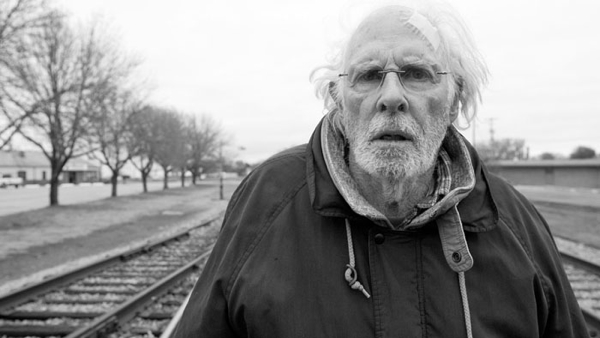Movie review by Greg Carlson
The monochromatic landscapes of Alexander Payne’s “Nebraska” capture the open fields of America during a quixotic father-son road trip in which nothing and everything happens all at once. Bob Nelson’s screenplay introduces Woody Grant (Bruce Dern) shambling along the side of the road in Billings, Montana. Armed with a sweepstakes letter and convinced he is to be the recipient of a million dollars, Woody either can’t or won’t accept the reality that there is no cash waiting for him in Lincoln. Soft-hearted son David (Will Forte), whose own life as a recently dumped stereo salesman is as static as his father’s, agrees to drive Woody to Nebraska even though David recognizes the prize offer as bogus.
Once Woody and David arrive in Hawthorne, the small town where Woody grew up and where many of his old acquaintances, flames, and relatives still reside, word gets out about the million dollar windfall. At this point, Payne shifts a great deal of attention to the avarice of Woody’s extended family, many quick to claim that Woody owes them money. David especially dislikes Woody’s old partner Ed Pegram (Stacy Keach), an unctuous bully who wants Woody to “make things right.” With echoes of stories like Mark Twain’s “The Man That Corrupted Hadleyburg,” “Nebraska” brings out the worst human nature. One wonders why, despite David’s protests, seemingly everyone in Hawthorne refuses to accept that Woody is no millionaire.
Like “The Man Who Wasn’t There,” “Nebraska” was also prepared in a color version to meet contractual requirements for particular international outlets, but articles posted by “Yahoo! News Canada” and “Variety” describe Payne’s longtime desire to make a black and white movie along with his hope that “no one ever sees” the color version of the film. The black and white is a perfect choice, and cinematographer Phedon Papamichael’s anamorphic widescreen images turn the establishing shots of broad, traffic-free main streets and proud old farmsteads into additional characters.
Walking the tightrope between serious and silly inevitably strains consistency in tone, and where Woody’s foggy reticence is often played for unspoken longing and regret (during, for example, the tour of his now-abandoned boyhood house), wife Kate (June Squibb) is a fountain of unfiltered and occasionally foul gossip about all manner of vice among her friends and neighbors. Squibb is very funny, even if her dialogue is not as entirely believable as the group of old men watching football and chatting about the makes of cars they used to own.
In many of Payne’s sharp-eyed films, from “Citizen Ruth” to “Election,” the filmmaker has skewered misguided power grabs and the sort of small stakes self-importance that makes for easily bruised thin skin. “Nebraska” offers up provincial yokels that run the gamut from big-hearted to greedy-eyed, and open for some debate is the extent to which Payne sympathizes with the folks who populate Hawthorne. At the center of it all is Woody, quite possibly exhibiting the early signs of dementia. Not everyone will accept or appreciate Woody’s uncommunicative, blank slate status (reliably performed by a tremendous Dern), but Payne delivers an earnest payoff that allows the old man to briefly transcend the simultaneous presence/absence of his impenetrable and unknowable character.
